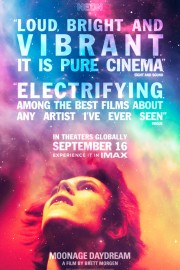Moonage Daydream
There are a lot of different ways for filmmakers to express their love of a particular musical artist. There’s including their music in your movie. There’s making a movie inspired by their life. Or, you can make a movie that lets them tell their story, typically in the form of a documentary. With “Moonage Daydream,” Brett Morgen takes the third option, but infuses it with a style and visual energy that we don’t often see in concert documentaries. The result moves a bit slow at 135 minutes, but you can imagine David Bowie being proud of the final film, and the message it presents from his life.
I’ll be honest in that I’m not as familiar with Bowie as a performer as I should be. I’ve heard some of his music, but I’m more used to seeing his performances in movies like “The Prestige” and “The Last Temptation of Christ” than his film. What I do know about him is that his charisma runs through both his music and his onscreen work, and “Moonage Daydream” captures that innately. Starting with his Ziggy Stardust era in the early ‘70s, Morgen explores Bowie’s career, and life, in constant evolution.
Back in 2019, I saw a film at the Atlanta Film Festival called “Speed of Life,” about how- at the time of Bowie’s death, a wormhole forms, and the main character finds themselves in the future, trying to reconcile her life and love. If you watched that film, with no real feeling of what Bowie meant to people, “Moonage Daydream” answers that question for you. The film uses performance footage, archived interviews, and never-before-seen personal footage to create a dizzying, but rich, exploration of the artist, and the man. From what we see- and hear- of Bowie’s art, it’s a portrait befitting it’s subject.
Two of the things I find myself thinking after watching “Moonage Daydream” are that a) I need to listen to more of Bowie’s work, and b) I feel like a kindred spirit with him, as an individual and an artist. He understood that art doesn’t move in a linear fashion; that creativity is not always a constant flowing of ideas; that challenges are essential to life and art; and that, sometimes, the last thing we expected might be the one thing we need, and when we find it, the most important thing to do is figure out how it fits in our lives. The slow parts in this film keep it from greatness, but the way Morgen captures the essence of his subject, it helps me see the greatness in Bowie in a way I didn’t see before.










